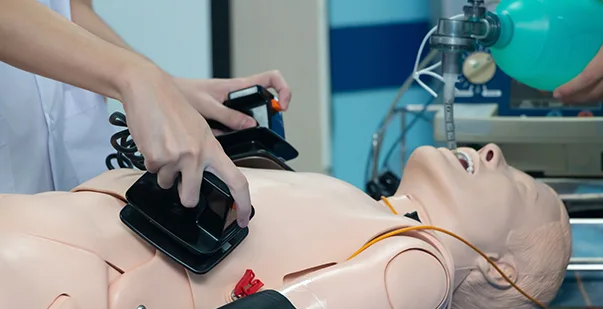When it comes to maintaining certifications in healthcare, understanding the value of Continuing Education Units (CEUs) is crucial. Basic Life Support (BLS) certification is a fundamental requirement for healthcare providers, but determining the number of CE hours it’s worth can be a common query. “How many CEUs for BLS” is a question that arises frequently among medical professionals seeking to stay current in life-saving techniques.
In this blog post, we shall look into the significance of CEUs in BLS certification, shedding light on the typical number of CE hours associated with BLS courses as in, How many CEUs for BLS renewal, and the importance of ongoing education in the healthcare field.
1. Understanding BLS CEU Requirements
Maintaining Basic Life Support (BLS) certification is essential for healthcare providers to respond effectively in emergencies. Understanding the Continuing Education Unit (CEU) requirements for BLS certification is crucial for staying current with life-saving techniques and ensuring compliance with certification standards.
- Importance of CEUs for BLS Renewal
Continuing Education Units (CEUs) play a vital role in BLS certification renewal. Healthcare providers are often required to earn a specific number of CEUs within a designated timeframe to renew their BLS certification. These CEUs ensure that providers stay updated on the latest guidelines and best practices in resuscitation and emergency care.
- Typical CEU Requirements for BLS Certification
The number of CEUs required for BLS certification renewal can vary depending on the certifying organization and specific guidelines. Typically, healthcare providers need to complete a certain number of CEU hours, often ranging from 4 to 8 hours, to renew their BLS certification. These CEU requirements ensure that providers maintain their skills and knowledge in life-saving procedures.
- Sources of BLS CEUs
Healthcare providers can earn the CEUs required for BLS certification renewal. These may include attending BLS renewal courses, participating in workshops, conferences, and online courses, or engaging in hands-on training sessions. Providers need to choose accredited CEU activities to ensure that the earned credits are recognized for BLS certification renewal.
Read more: How Many CE Hours Is BLS Worth?
2. Exploring BLS Renewal CEU Criteria
Renewing Basic Life Support (BLS) certification is a crucial requirement for healthcare providers to demonstrate proficiency in life-saving techniques. Understanding the Continuing Education Unit (CEU) criteria for BLS renewal is essential to ensure compliance with certification standards and stay updated on the latest guidelines in emergency care.
- CEU Criteria Overview for BLS Renewal
BLS renewal typically requires healthcare providers to earn a specific number of CEUs within a defined timeframe. The CEU criteria may vary depending on the certifying organization and the level of certification. Providers must familiarize themselves with the CEU requirements to successfully renew their BLS certification.
- Types of Activities That Qualify for BLS CEUs
Various activities can qualify for BLS Continuing Education Units (CEUs), including attending BLS renewal courses, participating in CPR training sessions, completing online modules, and engaging in hands-on simulations. Providers should ensure that the activities they choose are accredited and align with the CEU criteria for BLS renewal.
- Importance of Meeting CEU Criteria for BLS Renewal
Meeting the CEU criteria for BLS renewal is essential for healthcare providers to maintain their certification and demonstrate competency in life-saving procedures. By engaging in accredited CEU activities, providers can enhance their skills, stay current with best practices, and effectively respond to emergencies, ultimately improving patient outcomes and safety.
3. Determining the Value of BLS CE Hours
Determining the value of Continuing Education (CE) hours associated with Basic Life Support (BLS) certification is crucial for healthcare providers looking to maintain their skills and stay current with life-saving techniques. Understanding the significance of BLS CE hours can help providers ensure they meet certification requirements and deliver effective emergency care when needed.
- Calculating CE Hours for BLS Certification
Now How many CE hours is BLS renewal? The answer may vary depending on the organization providing the certification and the specific requirements. Typically, BLS courses are associated with a set number of CE hours, which providers must complete to earn or renew their certification. Calculating the CE hours required for BLS certification helps providers plan their training and education accordingly.
- Importance of Accredited CE Hours for BLS
Accredited CE hours for BLS certification ensure that providers receive quality education and training in life-saving procedures. Choosing accredited courses and activities guarantees that the earned CE hours are recognized by certification bodies and contribute to maintaining certification. Providers should prioritize accredited CE hours to ensure they meet certification standards.
- Maximizing the Value of BLS CE Hours
To maximize the value of BLS CE hours, healthcare providers can engage in a variety of activities, such as attending BLS renewal courses, participating in CPR training, conducting practice simulations, and staying updated on industry guidelines. By investing time in relevant and accredited CE activities, providers can enhance their skills, knowledge, and readiness to respond to emergencies effectively.
Read more: How Many CE Hours Is BLS Worth?
4. Navigating BLS Certification: CEU Insights
Navigating Basic Life Support (BLS) certification requirements can be a critical aspect of healthcare professionals’ ongoing education and training. Understanding the role of Continuing Education Units (CEUs) in BLS certification is key to ensuring that providers maintain their skills, stay current with best practices, and uphold certification standards in emergency care.
- Importance of CEUs in BLS Certification
CEUs are essential for healthcare providers seeking BLS certification renewal. These units reflect the ongoing commitment to professional development and skill enhancement in life-saving techniques. Understanding the importance of CEUs in BLS certification helps providers navigate the renewal process effectively and stay informed about industry standards.
- Meeting CEU Requirements for BLS Renewal
Navigating the CEU requirements for BLS renewal involves identifying the number of CEUs needed and selecting accredited activities to earn them. Providers should explore options such as attending BLS courses, CPR training sessions, workshops, and online modules to fulfill the CEU requirements. Meeting these requirements ensures compliance with certification standards.
- Strategies for CEU Success in BLS Certification
Healthcare providers can enhance their CEU success in BLS certification by creating a personalized education plan, staying organized with CEU tracking, seeking out diverse learning opportunities, and engaging in hands-on training. By developing effective strategies for earning and documenting CEUs, providers can streamline the certification renewal process and demonstrate proficiency in life-saving skills.
Read more: How Many CE Hours Is BLS Worth?
Conclusion
In conclusion, understanding the significance of Continuing Education Units (CEUs) for Basic Life Support (BLS) certification is paramount for healthcare providers committed to delivering high-quality emergency care. The question “How many CEUs for BLS” underscores the importance of ongoing education in maintaining proficiency in life-saving techniques.
By familiarizing themselves with BLS CEU requirements, exploring accredited CE activities, and investing in skill-enhancing opportunities, providers can not only meet certification standards but also improve patient outcomes and safety. Navigating the renewal process with diligence and strategic planning ensures that healthcare professionals remain equipped to respond effectively in emergencies, ultimately making a difference in saving lives.










